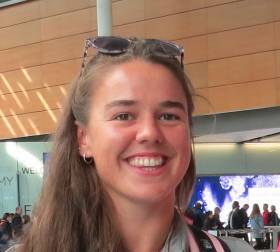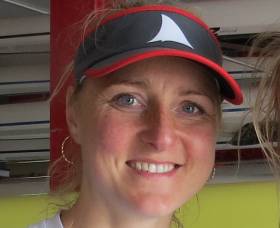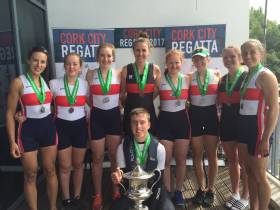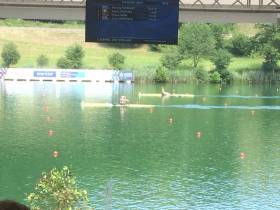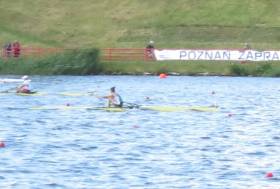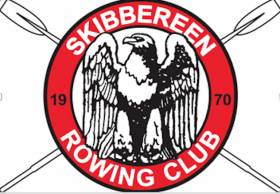Displaying items by tag: Puspure
Puspure Wins Single Sculls Heat in Italy
#Rowing: Sanita Puspure won her heat of the single sculls at the Memorial Paolo d’Aloja regatta in Italy, qualifying for Saturday’s A Final. The Ireland sculler had over a second to spare over second-placed Milda Valciukaite of Lithuania, an Olympic bronze medallist in the double in 2016. Emily Hegarty and Aifric Keogh qualified for the A Final of the pair with third in their heat, while Monika Dukarska and Aileen Crowley won a three-boat exhibition race in the women’s double.
Puspure Cruises Through to World Rowing Semi-Finals
#Rowing: Sanita Puspure won her repechage to qualify for the A/B Semi-Finals of the women’s single sculls at the World Rowing Championships in Sarasota-Bradenton today. The Ireland sculler was out on her own for virtually the entire 2,000 metres. She had three lengths over Lucie Zabova of the Czech Republic in the middle of the race and extended it to four by the finish. Both qualified.
In a major surprise Juan Dingli of China could only finish third in the second repechage and misses out on the chance of an A or B Final appearance.
The Ireland women’s pair of Aifric Keogh and Aileen Crowley finished fourth in their repechage, and will compete in the B Final. They were up with the leaders in the first 500 metres, but Britain and then Germany moved away from them and took the qualification places for the A Final. In the third quarter, China passed Ireland and held on to third despite a good finish by Crowley and Keogh.
World Rowing Championships, Sarasota-Bradenton, Florida – Day Four – Irish Interest:
Women
Pair – Repechage (First Two to A Final; rest to B Final): 1 Britain 7:25.99, 2 Germany 7:3.34; 4 Ireland (A Keogh, A Crowley) 7:41.13.
Single Sculls – Repechage (First Two to A Final; rest to B Final): 1 Ireland (S Puspure) 7:36.16, 2 Czech Republic (L Zabova) 7:45.98.
Puspure's Fast Finish Tests Favourite at World Rowing
#Rowing: Sanita Puspure took second place in her heat of the women’s single sculls at the World Rowing Championships in Florida today. The in-form Jeannine Gmelin won the race, holding fast to her long-held lead despite a fast finish by Puspure.
Only the winner qualified directly for the A/B semi-finals, and Puspure must find her way though a repechage.
Aifric Keogh and Aileen Crowley took third in their heat of the women’s pair. The race was won by the United States, who booked their place in the A Final.
World Rowing Championships, Sarasota-Bradenton, Florida – Day Two (Irish interest):
Women
Pair – Heat Two (Winner to A Final; rest to Repechage): 1 United States 7:06.26; 5 Ireland (A Keogh, A Crowley) 7:29.53.
Single Sculls – Heat Four (Winner to A/B Semi-Finals; rest to Repechage): 1 Switzerland (J Gmelin) 7:26.22, 2 Ireland (S Puspure) 7:27.11.
Big Win for UCD's Crowley and Lambe At Rowing Championships
#Rowing: UCD’s Eimear Lambe and Aileen Crowley had an impressive win in the women’s senior pair in the deferred finals at the start of the third day of the Irish Championships at the National Rowing Centre. Skibbereen and Cork were in the touch with the UCD women until 1500 metres, but Lambe and Crowley left the rest behind from there and won by 10 seconds from Skibbereen.
Queen’s were also impressive in their win in the men’s novice eight, and Sanita Puspure won the senior single sculls with plenty to spare.
The junior 16 men’s eight went to Enniskillen, who thus completed the set of wins: the junior 18 and 16 eights for men and women.
Irish Rowing Championships, National Rowing Centre, Day Three (Selected Results)
Men
Eight – Novice: Queen’s 6:21.56.
Sculling, Quadruple – Junior: 1 Three Castles 6:21.53, 2 Shandon 6:22.75, 3 Clonmel 6:23.05.
Women
Pair – Senior: UCD (A Crowley, E Lambe) 7:37.41.
Sculling, Single – Senior: Old Collegians (S Pupsure) 8:02.64.
Stars Come Out for Huge Irish Rowing Championships
#Rowing: A bumper weekend of racing is in store in Cork as the 2017 Irish Rowing Championships take place at the National Rowing Centre from Friday, July 14th to Sunday, July 16th. The event will showcase some of the best rowing Ireland has to offer with 1049 crews competing in 264 races.
The National Rowing Centre will welcome 60 clubs, including Waterville and Flesk Valley, who will compete at the Championships for the first time, as well as a re-formed Newry Rowing Club.
High Performance athletes including Gary and Paul O’Donovan, Sanita Puspure and Claire Lambe will be among those competing for the much coveted “Pots”, as well as European Champions Shane O’Driscoll and Mark O’Donovan, and European Silver medallist Denise Walsh.
Three superb days of racing were enjoyed at last year’s Championships, which came to a spectacular end with the men’s senior eights being fought right to the line. Commercial Rowing Club came away with the “Big Pot” in the end after a thrilling race, which saw them finishing less than a second ahead of rivals UCD.
Skibbereen, in combination with UCC, won the women’s senior eight. That win took Skibbereen’s overall tally for the Championships to 13 – they now have 163 titles in total, 11 clear of nearest rivals, Neptune (152).
#Rowing: Both of Ireland’s competitors made the semi-finals of the women’s single sculls at the World Cup in Lucerne. Sanita Puspure won her quarter-final, while Monika Dukarska took a comfortable third in hers.
Puspure had tough opponents. She battled it out with Felice Mueller of the United States and Ekaterina Karsten of Belarus throughout. They moved away from the rest of the field and though all three were all but guaranteed to take the qualification places, Puspure finished impressively to win.
Dukarska’s third was a clear one. Again, three women broke free. Carling Zeeman took over to win, with Annekatrin Thiele of Germany second and Dukarska not far behind – over 11 seconds clear of Eeva Karppinen of Finland in fourth.
World Cup Regatta, Lucerne, Day One (Irish interest)
Men
Lightweight Pair – Exhibition Race: 1 Britain (J Cassells, S Scrimgeour) 6:57.32, 2 Ireland (M O’Donovan, S O’Driscoll) 6:59.26, 3 Brazil 6:59.29.
Lightweight Double Sculls (First Two to A/B Semi-Finals; rest to Repechage) – Heat One: 1 France 6:27.36, 2 Britain One 6:30.70. Heat Two: 1 Greece 6:25.88, 2 Czech Republic 6:26.39; 3 Ireland (G O’Donovan, P O’Donovan) 6:28.63. Heat Three: 1 Italy 6:29.15, 2 Belgium 6:32.44.
Women
Single Sculls (Three to Quarter-Finals; rest to quarters or E Final) – Heat Three: 1 Austria (M Lobnig) 7:46.97, 2 Ireland Two (M Dukarska) 7:51.44, 3 Latvia (E Gulbe) 8:02.20.
Heat Five: 1 Britain (V Thornley) 7:45.65, 2 Ireland One (S Puspure) 7:47.84, 3 Finland (E Karppinen) 7:58.04.
Quarter-Finals (First Three to A/B Semi-Finals): QF One: 1 Ireland (Puspure) 7:52.50, 2 United States (F Mueller) 7:53.39,
3 Belarus (E Karsten) 7:59.13.
QF Three: 1 Canada (C Zeeman) 7:57.04, 2 Germany (A Thiele) 8:01.51, 3 Ireland (Dukarska) 8:03.64.
Puspure and Dukarska Race into Lucerne Quarter-Finals
#Rowing: Monika Dukarska and Sanita Puspure both qualified for the quarter-finals of the women’s single sculls at the World Cup regatta in Lucerne today.
Dukarska drew Magdalena Lobnig, the holder of the world’s best time in the event, in her heat. The Killorglin woman stuck with the Austrian as others let her go and finished second.
Puspure also took second in her heat, refusing to let Britain’s Victoria Thornley dominate the race. The two matched each other over the final stages, though both eased up coming to the line, with Thornley taking the victory by two seconds.
World Cup Regatta, Lucerne, Day One (Irish interest)
Women
Single Sculls (Three to Quarter-Finals; rest to quarters or E Final)
Heat Three: 1 Austria (M Lobnig) 7:46.97, 2 Ireland Two (M Dukarska) 7:51.44, 3 Latvia (E Gulbe) 8:02.20.
Heat Five: 1 Britain (V Thornley) 7:45.65, 2 Ireland One (S Puspure) 7:47.84, 3 Finland (E Karppinen) 7:58.04.
Dukarska Chosen in Ireland Team for Final World Cup
#Rowing: Monika Dukarska has been chosen to represent Ireland at the third World Cup Regatta in Lucerne early next month. The Killorglin woman finished ninth (third in the B Final) on her first foray as a single sculler at a World Cup event, in Poznan in Poland last weekend. She joins Sanita Puspure, who won the B Final in Poland. The Ireland lightweight pair of Shane O’Driscoll and Mark O’Donovan, who have taken gold in the previous two World Cups and in the European Championships will hope to continue their run. The lightweight double of Paul and Gary O’Donovan were silver medallists at the Europeans and in the World Cup in Poznan.
Ireland Lightweight Pair Continue Winning Ways
#Rowing: Mark O’Donovan and Shane O’Driscoll won their test race of the lightweight pair at the World Cup Regatta in Poznan, Poland this morning. Britain tested them through three-quarters of the race, but held off when it was clear they would again have to give way to the men in green.
Sanita Puspure and Monika Dukarska finished third and fourth in their heat and missed out on direct qualification in the heats of the women’s single sculls. New Zealand’s Hannah Osborne won a battle with Puspure to take second behind the dominant Vicky Thornley of Britain.
The Ireland pair of Aifric Keogh and Aileen Crowley took fourth in their heat.
Skibbereen Regatta Has Big Numbers and Homegrown Stars
#Rowing: Skibbereen Regatta on Friday and Saturday, April 8th and 9th, at the National Rowing Centre in Cork, is a huge event which gives spectators and athletes a chance to see medal winners from Olympic Games, World Championships – and the women’s Boat Race. Claire Lambe, a Boat Race winner last Sunday with Cambridge, teams up with double Olympian Sanita Puspure in a double scull.
Olympic medallists Paul and Gary O’Donovan will join Mark O’Donovan and Shane O’Driscoll in a four and in a quadruple.
Paul O’Donovan, the world champion in the lightweight single sculls, joins Gary in the draw for the Division One single sculls. The event, with an entry of almost 700, is the first in the three-event Grand League: Dublin Metropolitan (Metro) and Cork will follow on in May and June.


























